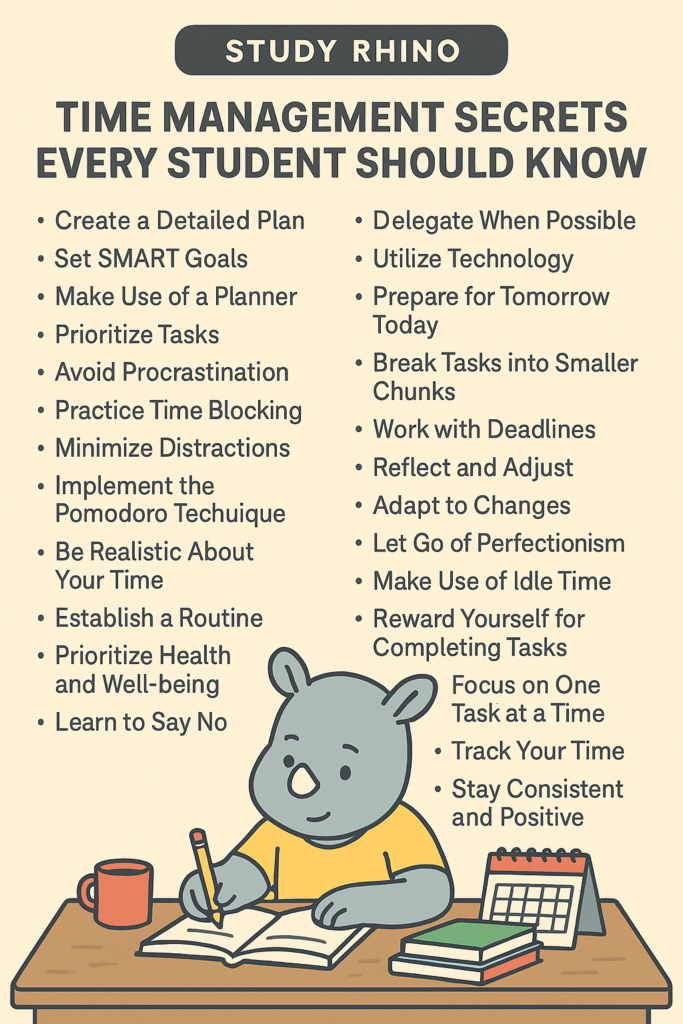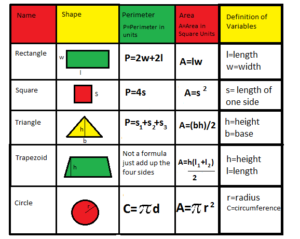Time management is one of the most crucial skills a student can develop. The ability to organize time effectively can improve academic performance, reduce stress, and create a sense of balance between studies and personal life. With the right strategies, students can accomplish their tasks more efficiently, ensure they meet deadlines, and still have time for relaxation and recreation. In this article, we’ll delve into 25 effective time management techniques that every student should be aware of to maximize productivity and practice effective time management for students.
1. Create a Detailed Plan
Planning is key to effective time management. Start by mapping out your week, listing everything that needs to be accomplished, from assignments to personal commitments. A clear plan provides a roadmap for your day and ensures you don’t forget any important tasks. Setting goals for each day helps maintain focus and direction. Proper planning is a cornerstone of effective time management for students.
2. Set SMART Goals
Setting goals that are Specific, Measurable, Achievable, Relevant, and Time-bound (SMART) can significantly enhance your productivity. Break down larger tasks into smaller, manageable objectives, and keep track of your progress. SMART goals help keep you motivated and allow you to measure success, ensuring effective time management for students.
3. Make Use of a Planner
Whether physical or digital, a planner can help you stay organized. Scheduling tasks and deadlines in a planner lets you visualize your week, allocate time for assignments, and prevent overcommitting. You can use apps like Google Calendar or specialized time management tools to keep track of your commitments, improving your effective time management for students.
4. Prioritize Tasks
Effective time management involves prioritizing tasks based on importance and urgency. Identify what needs to be done first and what can be tackled later. Tasks that are both urgent and important should take precedence. This will ensure that deadlines are met without unnecessary stress. Prioritizing tasks is a key element of effective time management for students.
5. Avoid Procrastination
Procrastination can undermine the best-laid plans. Overcoming this habit requires self-discipline. Break tasks into smaller segments to make them less intimidating, and tackle the most difficult ones first. Starting with even just a small step can help you gain momentum, making procrastination less of a barrier in effective time management for students.
6. Practice Time Blocking
Time blocking involves allocating specific periods in your day to focus on particular tasks. This method helps in maintaining focus and avoiding multitasking. Set clear time frames for studying, breaks, meals, and other activities. Time blocking ensures you stay on track and prevents distractions, an essential strategy for effective time management for students.
7. Minimize Distractions
In today’s digital age, distractions are abundant. Turn off phone notifications, close irrelevant tabs on your computer, and let others know when you need to focus. Creating a quiet, distraction-free environment is crucial for productive study sessions and overall effective time management for students.
8. Implement the Pomodoro Technique
The Pomodoro Technique is a popular time management method that involves working in 25-minute intervals, followed by short 5-minute breaks. After completing four intervals, take a longer break. This technique helps maintain concentration and prevents burnout, making it an excellent approach for effective time management for students.
9. Be Realistic About Your Time
Overcommitting can lead to stress and decreased productivity. Be realistic about what you can accomplish in a given time frame. Set achievable goals and avoid overloading yourself. It’s better to complete a few tasks well than to rush through many tasks poorly, an important consideration for effective time management for students.
10. Establish a Routine
Consistency is essential for effective time management. Establishing a daily routine helps to make the best use of your time. By allocating regular times for studying, meals, and relaxation, you can create a balance that helps reduce stress and increase productivity—core components of effective time management for students.
11. Prioritize Health and Well-being
Maintaining your physical and mental health plays a significant role in your ability to manage time effectively. Ensure you get adequate sleep, eat well, and engage in regular physical activity. A healthy body and mind are key to maintaining focus and energy levels, which contributes to effective time management for students.
12. Learn to Say No
As a student, it’s essential to recognize when you’re overburdened and learn to decline additional tasks or social invitations that may interfere with your studies. Saying no politely ensures that you focus on your most important commitments, which is vital for effective time management for students.
13. Delegate When Possible
In group assignments or collaborative projects, delegate tasks to others based on their strengths. This not only ensures a more balanced workload but also helps everyone in the group manage their time effectively. Delegating tasks can save time and lead to better results, making it an important aspect of effective time management for students.
14. Utilize Technology
There are numerous apps and tools designed to help students manage their time effectively. Apps like Todoist, Trello, or Notion help you create to-do lists, track deadlines, and keep organized. Technology can be a powerful ally in staying on top of your tasks and ensuring effective time management for students.
15. Prepare for Tomorrow Today
Before you end your day, take a few moments to prepare for the following day. Review your tasks, set priorities, and organize materials. This simple habit can help you start the next day with a clear focus and reduce morning stress, ensuring smooth effective time management for students.
16. Break Tasks into Smaller Chunks
Breaking larger tasks into smaller, more manageable parts can make them seem less overwhelming. For example, instead of “study for the exam,” break it down into “review chapter 1,” “take notes on chapter 2,” and so on. This method makes progress feel more achievable and supports effective time management for students.
17. Work with Deadlines
Deadlines are powerful motivators. If an assignment doesn’t have a set deadline, create one for yourself. Having a concrete timeline for tasks ensures that you stay focused and can allocate time to complete each task within the required period, a core aspect of effective time management for students.
18. Reflect and Adjust
Regularly reflecting on your time management strategies can help you identify areas for improvement. Take note of what’s working and what’s not, and adjust your approach as needed. Flexibility in your methods is key to maintaining efficiency and effective time management for students.
19. Adapt to Changes
Unexpected events can disrupt your plans, and that’s okay. Being adaptable allows you to reorganize your schedule and handle unforeseen circumstances with less stress. A rigid schedule can cause frustration when things go awry, so build some flexibility into your plans for effective time management for students.
20. Let Go of Perfectionism
Perfectionism often leads to wasted time. Instead of focusing on making everything flawless, strive for completion and improvement. It’s more effective to submit a good assignment on time than to miss the deadline in pursuit of perfection. Embracing this mindset promotes effective time management for students.
21. Make Use of Idle Time
There are often small pockets of time throughout the day when you’re waiting—whether it’s between classes or while commuting. Use this time to review notes, read a chapter, or organize your to-do list. These moments can be surprisingly productive and contribute to effective time management for students.
22. Reward Yourself for Completing Tasks
Incentivize yourself to stay on track by rewarding yourself after completing a task. This could be as simple as taking a break, enjoying a treat, or watching a favorite show. Positive reinforcement helps maintain motivation and makes working toward goals more enjoyable, which reinforces effective time management for students.
23. Focus on One Task at a Time
Contrary to popular belief, multitasking can reduce your efficiency and performance. Focus on completing one task at a time with full attention. This leads to better-quality work and helps you finish tasks faster, which is central to effective time management for students.
24. Track Your Time
Keep a record of how you spend your time over the course of a day or week. By tracking your activities, you can identify patterns and areas where time might be wasted. This self-awareness is the first step toward optimizing how you use your time for effective time management for students.
25. Stay Consistent and Positive
Building strong time management habits takes time and practice. Stay consistent with your strategies, and be patient with yourself. If you fall off track, don’t be discouraged—simply adjust and keep moving forward. Maintaining a positive attitude will help you stay motivated and achieve effective time management for students.
Conclusion
Time management is an essential skill that every student should develop to succeed academically and personally. By adopting effective strategies like prioritizing tasks, eliminating distractions, setting realistic goals, and creating a structured routine, you can master your time and achieve your academic goals. Time management isn’t about doing more—it’s about doing what matters most efficiently. With practice and consistency, these techniques will help you gain control over your schedule, reduce stress, and unlock more opportunities for success. Achieve your academic and personal goals through effective time management for students.




